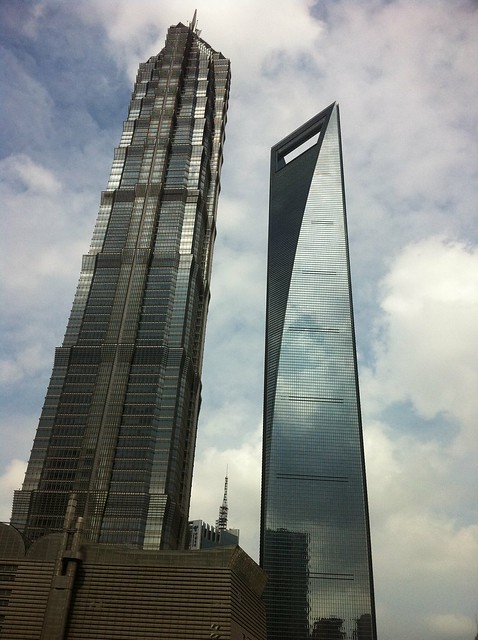The topic of buying a MacBook Air, and Why I Won’t Return my MacBook Air is getting more and more interesting. When I am thinking through it, I surprisingly find how a single decision relates to a broad range of topics, including the valuation of time, decision making process, losing face, desire for the better. Let me examine these one by one.
The Value of Time
The key reason I won’t return the MacBook Air is about time. Waiting for another two weeks, and also bear the risk of initial shortage of supply, or even longer if I want to ask someone to buy it from Palo Alto and bring it to Shanghai to save about 10%? Or imagine enjoy the new laptop right now at desk of my hotel, at SFO airport, on plane (I heard the battery last for 7 hours which fit into my schedule), show it off to Wendy and try to hide it from the sight of Yifan?
Hmmm… It is so appealing the happiness NOW, is more valuable than the happiness of tomorrow. (An experiment from another psychologist shows that people generally value $100 right now, v.s. $1000 the same day after 10 years).
It leads to the broader question: what is exact the value of NOW, vs even few hours later. A typical example is about buying a book. You enter a bookstore and you see a really good book. You know it for sure that Amazon offers 20% off of the same thing. Still, there are a lot of people (including me) want to buy it now, v.s. wait for its delivery even the second day. If the difference is, let’s say, 1 dollar, most people don’t bother. Just buy it. If the difference is $20, not sure. The different becomes $200? Most people would buy it online. Why is that? Shall I see the value of NOW vs 24 hour later is $20 on average? Where does this price comes from? Proportional with daily salary, or anything else? I am just very curious.
OK. That is factor #1. As a rational decision, shall we take the dollar amount cost of “waiting” into consideration and compare it with the value a better processor brings?
Decision Making Process
Another interesting finding I got was, the time and energy needed to make a decision does not vary too much for things with different dollar value. Choosing the flavor of ice cream is as time consuming as choosing a MacBook, and not proportional less easier than choosing to buy a house, a round of corporate financing.
Rationally, I understand that buying a house is a bigger decision. Sometimes, just because I like the shape of window, or it is 2 miles nearer to work, we’d choose a house over another one, which easily cost us the money to buy a MacBook every month for the next few years. But the decision to choose which model of MacBook is equally time consuming. Why is that? Is it because the human brain develops without the concept of money 1 million years ago so it does not have that function (without good training on that)? Or is it because both decisions cost the same circle of CPU time of our brain, regardless of the value?
A lot of people choose to form some “my favorite …” to help on that. “My favorite is strawberry” – that helps me a lot in choosing my flavor for ice cream, and that is the tendency I squeeze myself into just a small corner of the world, with no chance to explore the chocolate flavor, or the land at the other side of the sea.
What bothers me is, why I spent some much time on this decision at the first place.
Losing Face, or Mianzi
I agree that there are some type of feeling losing face involved to claim I won’t return it in the last blog. I actually thought it was not a factor at all, but after deeply replay what I thought, I admit it was a factor. However, with just marginal impact.
People know me I openly admitted a lot of thing that makes me to lose face on this blog. I enjoy the fact to discover how stupid I am, because I am just a human. Just like life is perfectly imperfect, I am perfectly stupid a lot of times. Let me share something embarrassing that I didn’t tell in the last post. I actually visited the Apple Store the last night in Palo Alto, and wandered in it for half an hour, and still didn’t make up my mind to return it. I called Wendy and shared how embarrassing I was to spend so much time on such a simple decision, while I can make a decision worth of few million USD, in an hour.
But, I don’t feel bad about it. Benjamin Disraeli said “Fear makes us feel our humanity.”, my incompetency to make a decision quicker also makes me feel my humanity, and I am genuinely curious about why is that.
The Desire for the Better
Well. I admit if I had known about the news, I won’t buy it. I just didn’t know. Why? Just because lack of time and energy to track the new tech stuff. I didn’t open the box of MacBook Air not because I don’t see the value of NOW, as I just mentioned, it is because I think it is a bad idea to open the box to check out what’s new at 3 am after finish some important documents. I already regretted to open Nexus One at Night during my last trip in 2010.
The deeper reason why I didn’t trace the technology trend as I did when I was college graduate is, I started to find more source of happiness, and think it is less and less important for my life (a sign for aging?). I chased Intel 8086, 286, 386, 486, Pentium, Pentium II, Windows 3.2, 95, 98, Me, 2000, XP in my old days, and I chased the release of many product, but my recently ignorance of technical trend actually made me feel better.
I didn’t notice the slowness of iPhone until someone tells me how powerful the future iPhone will be. I didn’t complain about not able to share the photo wirelessly to my iPad until I watched the launch of iCloud of OS 5. “Stupid!” I should NOT have watched, which let me aware of how out-of-date my current iPhone is, even before OS 5 is available.
That desire for the better aligns our desire to get a bigger house, a better car, more money in the bank account (how strange it is that most people think bank account balance more important about the quality of the breakfast before their face). Shall we simply get rid of the desire, or at least constrain it a little bit by focusing on just a few desire, not everything?
I WILL Return my MacBook Air
After thoroughly examine what I thought, and explorer the reasons behind every thought, I felt great satisfaction about know the humanity of myself better. The value of getting a MacBook Air right now is not that important to me. I still want it, but I can wait for another month. I will return it on the way to Stanford fireworks tonight, with peace in my mind.
If you have another reason that I should or should NOT return it, please leave a comment. It will increase my level of happiness if you share this article to your friend (my humanity also include certain level of vanity).

